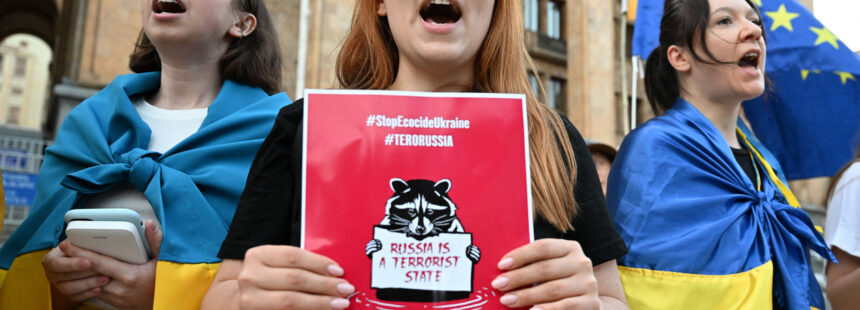“In my view, the question is irrelevant — of course it’s Russia’s war, as it was Nazi Germany’s war,” Kasparov said. “But for some of them it’s very painful. They say ’No, no, we are not responsible for the war. We have to make sure the Russian people are not dragged in.’”
Sergei Guriev, a prominent Russian economist, made a distinction between guilt and responsibility. Guilt should be ascribed to Putin, his collaborators and those directly committing crimes against Ukrainians.
That said, “I’ve never voted for Putin, but I didn’t fight him well enough to prevent this war, and for this, of course, I feel responsible,” said Guriev, who is based in Paris — having fled Russia like many members of the Russian dissident community.
Ukrainians engaged in public campaigns of support for their country have different degrees of distrust for Russian opposition leaders.
Kasparov is more respected than many others partly because he’s willing to speak about the need for Russians to broadly take responsibility. Kasparov regularly appears on Ukrainian media. He also has helped raise money for Ukrainian groups through the Renew Democracy Initiative, an American organization, said Uriel Epshtein, the group’s executive director.
Navalny, the longtime Putin opponent, may be the biggest threat to the Russian leader, even from the penal colony where he is being held in Melekhovo, 150 miles east of Moscow. But many Ukrainians are skeptical of him because for years he was ambiguous about whether Crimea should be returned to Ukraine.
Navalny clarified he believes that Russia does need to leave Crimea in a series of tweets this past February, but his Ukrainian critics are not fully convinced.
Demonizing Russians as a whole “is disastrous for the future peace of Europe,” warned Anatol Lieven and George Beebe of the Quincy Institute for Responsible Statecraft, which advocates for a more militarily restrained U.S. foreign policy.
“While the people who express such feelings about Russia claim to be opposing the Putin regime, their actions and writings in fact provide better domestic propaganda for Putin than he himself could ever have devised,” the pair wrote, nodding to Kremlin claims of rampant global “Russophobia.”


